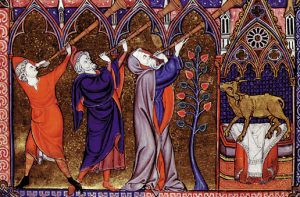Aaron in the Bible
Bible Review‘s Supporting Roles by Elie Wiesel
Elie Wiesel May 03, 2022 30 Comments 38979 views


Aaron, the first high priest and brother to Moses, worships the golden calf, in an illumination from the late-13th-century manuscript La Somme le Ray. Elie Wiesel points out that this incident, which had disastrous consequences for the Israelites fleeing Egypt, cast a shadow over Aaron. In Exodus 32, Aaron instructs the Israelites, who had grown restless during Moses’ long sojourn at Mount Sinai, to gather their jewelry and fashion a golden calf. He then constructs an altar and begins to worship. When Moses returns and sees the people worshiping the calf, he is angered by their idolatrous sin and throws down the stone tablets inscribed with the Ten Commandments. Later, when the Lord punishes “the people who through Aaron made the bull-calf” (Exodus 32:35), Aaron remains unharmed—a mystery Wiesel raises but cannot solve. Photo: British Library MSADD 28162, Folio 2V.
I have a problem with Aaron, number two in the great and glorious epic that recounts the liberation of the Jewish people from slavery in Egypt. He is a man of peace. He succeeds at everything. Everyone admires, even loves him. Whether great or small, they need him, his understanding and his mediation. Whatever he does, he is well regarded.
But is it possible that Aaron is without fault? Like all biblical characters, he must be imperfect. He too has his moments of weakness and his crises. But in those he is forgiven.
His younger brother Moses must overcome obstacles and dangers. More than once, Moses’ life has been threatened and his reputation questioned. But not Aaron, who passes through difficulties unscathed. Moses is often torn between two passions, two obligations: the demands of God and those of his people. But not Aaron. When the Hebrews became impatient and restless in the desert, demanding food and drink, they did not rise up against Aaron, but against Moses. Likewise, when God became angry at the people for their lack of faith, most of the time his anger was directed at Moses alone. Is this because Moses, the great political and military leader, represented civil authority, while his brother Aaron, the high priest, embodied spiritual authority? One would say that providence seemed to smile more on Aaron than on Moses.
While the Hebrews were still in Egypt, enslaved and suffering under Pharaoh’s harsh laws, it was Moses who defended them, going so far as to kill an Egyptian guard who was beating a Jewish slave. In the desert, again it was Moses who had to strike the rock to find a source of water. One gets the impression that as soon as there was danger, Aaron slipped away from the scene.
Nevertheless, Aaron’s balance sheet is not completely clean. At least two disconcerting episodes cast a shadow over his life. If the first arises out of his public persona, the second is strictly personal.


The first is linked to the golden calf. That Aaron played an important role in this episode is clearly indicated in the text. True, the idea of making the golden calf comes from the people, but it is Aaron who gives it life. It is Aaron who collects the golden jewelry; it is he who builds the altar and lights the flame; it is he who makes the idol. Aaron even goes so far as to invite the idolatrous masses to a feast the next day. To celebrate what? The birth of a new god? Or a new faith? “Chag la adoshem machar,” he cries. “Tomorrow is a feast unto the Lord.” Has he forgotten the Law that the Lord gave to the people of Israel gathered at the foot of Mount Sinai? Has he forgotten his brother, who ascended to the heavens to receive it in the name of this very people?
Our website, blog and email newsletter are a crucial part of Biblical Archaeology Society‘s nonprofit educational mission
This costs substantial money and resources, but we don’t charge a cent to you to cover any of those expenses.
If you’d like to help make it possible for us to continue Bible History Daily, BiblicalArchaeology.org, and our email newsletter please donate. Even $5 helps:
Naturally, God becomes angry. Against his people? Yes, but also, indirectly, against Moses. God tells him, “Go down and you will see how far (to what point) your people has corrupted its faith and truth” (Exodus 32:7). God does not even mention Aaron. God condemns the entire people of Israel, but silently passes over the fact that it is the high priest himself who has fashioned—with his own hands—this idol. Note well: God seems critical of Moses, who is blameless, but not of his brother, who collaborated—either voluntarily or under duress—in an abomination that had disastrous consequences: Three thousand Israelites died (Exodus 32:28). It was the will of God: The men of the tribe of Levi went from gate to gate, each with the order to kill his brother, his friend, his parent (Exodus 32:27).
Read an interview BAR Editor Hershel Shanks conducted with Elie Wiesel and Biblical scholar Frank Moore Cross, republished from BAR, July/August 2004 >>
But…where is Aaron? Has he joined the killers of his own tribe? He was not among the victims—that is certain, since he continued to live for many more years, fulfilling his priestly functions. As though nothing had happened. As though God had forgiven him, and him alone, for a sin for which three thousand others had died at the hand of their avengers.
Don’t we have the right to ask the text, why this favoritism to Aaron? In the Midrash,a our sages try hard to answer this question and end up inventing several explanations that exonerate Aaron. For example: Aaron had no choice. If he had refused, he would have been assassinated. Or: It was out of loyalty to Moses that he agreed to make the idol—all alone. Thus, far from the crowd, Aaron deliberately stretched things out to give Moses time to return from his mission. Or another: Aaron chose to commit the sin himself, rather than have the people commit it, thus saving them from greater guilt and condemnation without mercy.
Yes, Aaron is certainly well loved in the Midrash—a little less in the Bible, let’s admit it. When God explains to Moses why he and his brother Aaron may not enter the Promised Land, he uses harsh words, hurtful arguments. But, Aaron can console himself because he is not the only one to be blamed.
The second episode is no less troubling. It concerns the malicious words Aaron and his sister Miriam direct against Moses. They seem to reproach him for his superiority over them—and also for his marriage to a black woman, a non-Jew, a “Cushite” (Numbers 12). God judged it necessary to reprimand them, and to punish Miriam—her skin becomes white with leprosy (Numbers 12:10).
There again, we cannot understand the divine attitude toward this “first family” of the Jewish people: If Miriam was guilty, so was Aaron. But he was not punished. Here again, the Midrash moves heaven and earth to explain this divine inequity.
The lesson of this story: In the Bible, as in life, there are some problems that remain insoluble.
Translated from French by Anne Renner.
Notes:
a. Midrash is a genre of rabbinic literature that includes nonliteral elaborations of biblical texts.
The author of more than 30 novels, plays and profiles of Biblical figures, Elie Wiesel received the Nobel Peace Prize in 1986. This online publication is adapted from Wiesel’s article “Supporting Roles: Aaron,” which was published in Bible Review in December 1998. At the inception of Wiesel’s Supporting Roles series in Bible Review, BAS editors wrote:
We are pleased—and honored—to present our readers with the first of a series of insightful essays by Elie Wiesel, the world-renowned author and human rights advocate. Wiesel is best known for his numerous books on the Holocaust and for his profiles of Biblical figures and Hasidic masters. In 1986, he was awarded the Nobel Peace Prize. His occasional series for BR will focus on characters in the Bible that do not occupy center stage—those who play supporting roles.
More “Supporting Roles” by Elie Wiesel in Bible History Daily:
Get more biblical Archaeology: Become a Member
The world of the Bible is knowable. We can learn about the society where the ancient Israelites, and later Jesus and the Apostles, lived through the modern discoveries that provide us clues.
Biblical Archaeology Review is the guide on that fascinating journey. Here is your ticket to join us as we discover more and more about the biblical world and its people.
Each issue of Biblical Archaeology Review features lavishly illustrated and easy-to-understand articles such as:
• Fascinating finds from the Hebrew Bible and New Testament periods
• The latest scholarship by the world’s greatest archaeologists and distinguished scholars
• Stunning color photographs, informative maps, and diagrams
• BAR’s unique departments such as First Person and Strata
• Reviews of the latest books on biblical archaeology
The BAS Digital Library includes:
• 45+ years of Biblical Archaeology Review
• 20+ years of Bible Review online, providing critical interpretations of biblical texts
• 8 years of Archaeology Odyssey online, exploring the ancient roots of the Western world in a scholarly and entertaining way,
• The New Encyclopedia of Archaeological Excavations in the Holy Land
• Video lectures from world-renowned experts.
• Full online access to 50+ curated Special Collections,
• Four highly acclaimed books, published in conjunction with the Smithsonian Institution: Aspects of Monotheism, Feminist Approaches to the Bible, The Rise of Ancient Israel and The Search for Jesus.
The All-Access membership pass is the way to get to know the Bible through biblical archaeology.



